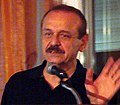First Arafat Government | |
|---|---|
| 1st Cabinet of Palestinian National Authority | |
| Date formed | 5 July 1994 |
| Date dissolved | 17 May 1996 |
| People and organisations | |
| Head of government | Yasser Arafat |
| Total no. of members | 20 |
| History | |
| Successor | Second Arafat Government |
 |
|---|
Officeholders whose status is disputed are shown in italics |
| |
The First Arafat Government was formed in 1994, when Yasser Arafat returned to Palestine, settling in Gaza City and promoted self-governance for the Palestinian territories. [1] The government was dissolved following the 1996 Palestinian general election.






